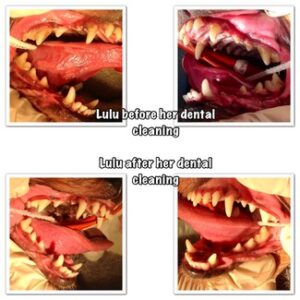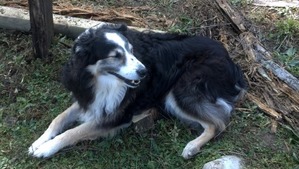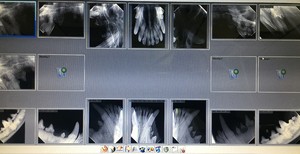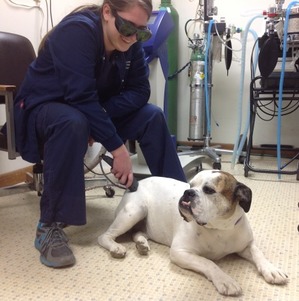Small Animals
Small Animals
Wellness Exam and Vaccinations

An exam is done once a year or every 6 months to check the current health status of an animal. We check the heart, lungs, temperature, check lumps and bumps, and check ears… Ideally, blood work should be done…Chemistry Screening, Electrolyte panel, and Complete Blood Count (CBC) to evaluate the function of the internal organs. Evaluating the urine for abnormalities and Chest X-Rays may be recommended.
Proper vaccinations are extremely important for the health of your pets.
We offer the following Vaccinations:
 Canine
Canine
- Rabies Vaccine
- DHLPP or DHPP Vaccine (Distemper, Adenovirus Type 2, Parainfluenza, Parvovirus, Leptospirosis)
- Lyme Vaccine
- Bordetella Vaccine (Kennel Cough)
Feline
- Rabies Vaccine
- FVRCP Vaccine (Feline Rhinotracheitis, Calicivirus, Paleukopenia)
- Feline Leukemia Vaccine (FeLV)
- Feline Immunodeficiency Vaccine (FIV)
Comprehensive Oral Health Assessment and Treatment
 A dental examination should be part of your pet’s regular health checkup. Dental problems can be prevented or treated with regular cleaning and scaling done under general anesthesia by a veterinarian.
A dental examination should be part of your pet’s regular health checkup. Dental problems can be prevented or treated with regular cleaning and scaling done under general anesthesia by a veterinarian.
Oral disease is the most common health problem for pets. By the age of 3, approximately 80% of dogs and 75% of cats have developed periodontal disease. Left untreated, the infection can lead to tooth decay or tooth loss and can even spread through the bloodstream and cause kidney, liver, lung, and heart problems. However, it is easily treatable and can be prevented by following a program of regular veterinary dental exams and a home dental care routine.
Common Signs of Oral Disease:
- Yellow-brown tartar near the gum line
- Red, swollen, or bleeding gums
- Persistent bad breath
- Abnormal drooling
- Pawing at the mouth
- Loose or missing teeth
- Difficulty eating or loss of appetite
Common Surgeries
 Spay (ovariohysterectomy), Neuters (castration), Declawing (in cats), Mass removals
Spay (ovariohysterectomy), Neuters (castration), Declawing (in cats), Mass removals
We use cutting-edge surgical lasers to perform the majority of our surgical procedures. Laser surgery is recognized in human and veterinary medicine for the significant benefits it provides to both patients and surgeons. Several types of lasers are used for different applications, the carbon dioxide device is primarily used for soft tissue surgery.
Benefits of Surgical Laser:
- Reduced Pain – The CO2 laser beam seals nerve endings as it cuts through tissue. This reduces the amount of pain the patient feels during and after surgery.
- Reduced Bleeding – The CO2 laser beam cauterizes and seals small blood vessels as it cuts. This laser energy achieves hemostasis (the process which causes blood to stop) and provides the surgeon with a bloodless surgical field in most procedures.
- Reduced Swelling – There is no physical contact between the laser and the surgical region, eliminating the tearing and bruising of tissue associated with traditional surgical methods.
- Quicker recovery – As a result of all of the above, laser surgery provides a quicker recovery period.

For more information on Surgical Laser visit www.celasers.com/veterinary
Pocket Pals
 Those that would fit in your pocket…rabbits, guinea pigs
Those that would fit in your pocket…rabbits, guinea pigsWellness checks and sick visits.
Ferrets
 Ferrets are considered exotic animals. We do yearly wellness exams, spay & neuter if needed, and vaccinate for distemper and rabies yearly. (Most ferrets usually are spayed or neutered as well as descented before they are sold to pet stores).
Ferrets are considered exotic animals. We do yearly wellness exams, spay & neuter if needed, and vaccinate for distemper and rabies yearly. (Most ferrets usually are spayed or neutered as well as descented before they are sold to pet stores).Digital Dental Radiographs
 Dental radiographs (x-rays) are very important tools available to veterinary dentists. These x-rays allow the close examination of the internal anatomy of the teeth, the roots, and the bone surrounding the teeth for a potential disease that may be occurring under the gum line. This will help determine the true health of a tooth. During a dental procedure, your pet’s entire mouth will be mapped out and evaluated using dental probes and dental x-rays. The information will help with decisions regarding the best dental care for your pet’s teeth.
Dental radiographs (x-rays) are very important tools available to veterinary dentists. These x-rays allow the close examination of the internal anatomy of the teeth, the roots, and the bone surrounding the teeth for a potential disease that may be occurring under the gum line. This will help determine the true health of a tooth. During a dental procedure, your pet’s entire mouth will be mapped out and evaluated using dental probes and dental x-rays. The information will help with decisions regarding the best dental care for your pet’s teeth.Cold Laser Therapy
 Cold Laser Therapy effectively treats pain associated with :
Cold Laser Therapy effectively treats pain associated with :
- Arthritis
- Tendonitis
- Wounds
- Post-Surgical Swelling
- Inflammed Ears
- Lick Granuloma
- Hip Dysplasia
- Disc Disease
- Sinusitis
- AND MUCH MORE!!!!
For more information about cold laser therapy visit www.celasers.com/veterinary


